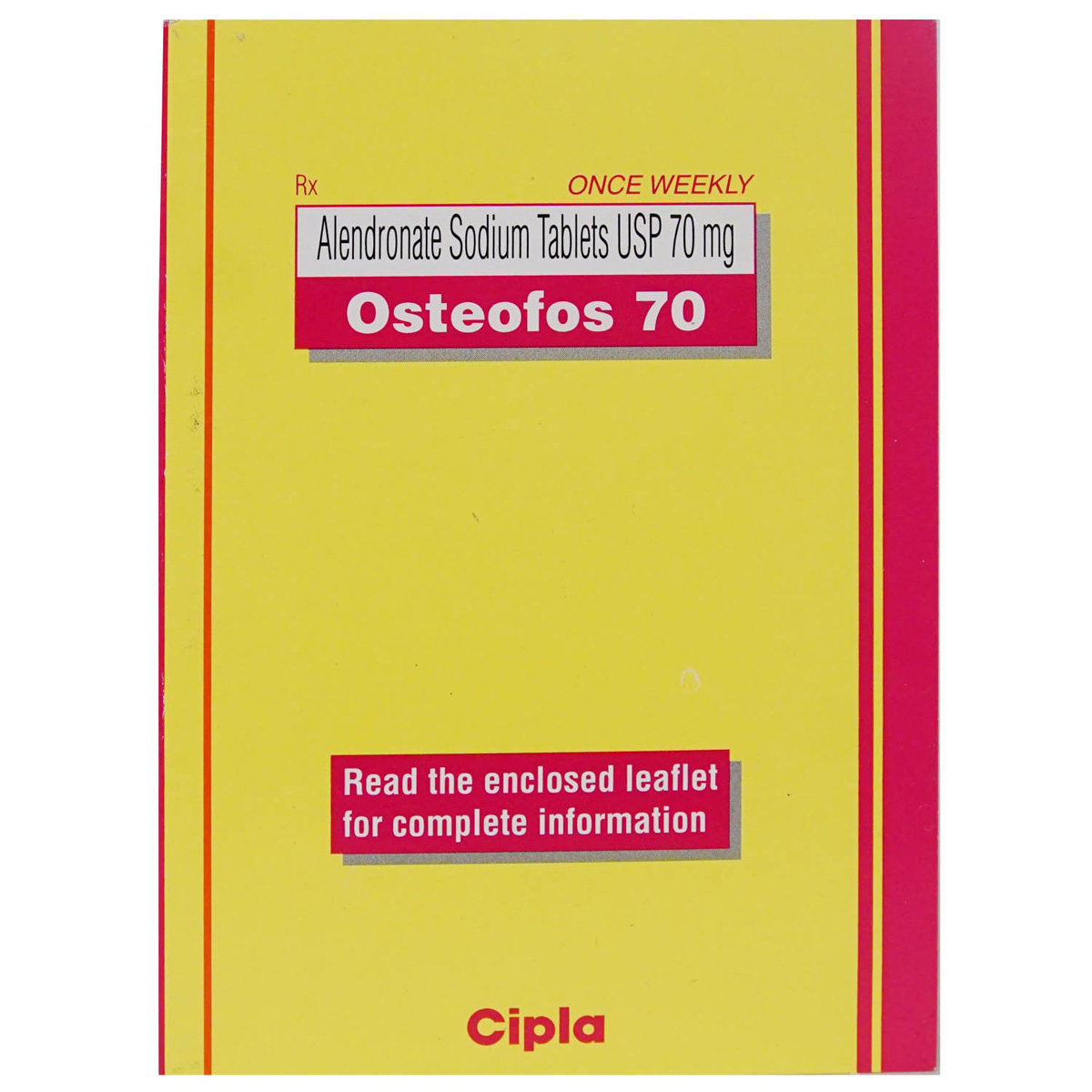Alendronate Sodium
About Alendronate Sodium
Alendronate Sodium is used to prevent and treat osteoporosis in adults, helping to strengthen bones. This medicine also helps to reduce the risk of spine and hip fractures.
Alendronate Sodium contains 'Alendronate sodium', which prevents bone breakdown by slowing bone loss. This helps keep bones strong, increases bone thickness, and reduces the risk of broken bones (fractures).
Alendronate Sodium may cause side effects like stomach pain, constipation, nausea, gas, and diarrhoea. Most of these side effects of Alendronate Sodium do not require medical attention and gradually resolve over time. However, if the side effects persist or worsen, please consult your doctor.
Do not take Alendronate Sodium if you are allergic to any of its components. Keep your doctor informed about your medications and health conditions to prevent any potential interactions.
Uses of Alendronate Sodium
Medicinal Benefits
- Alendronate Sodium is used to treat and prevent osteoporosis in individuals with weak or brittle bones, especially in postmenopausal women.
- It helps reduce the chances of fractures, particularly in the spine and hip, by increasing bone strength.
- Alendronate Sodium helps rebuild and increase bone mass, making the bones thicker and stronger over time.
- It is beneficial for individuals who develop osteoporosis as a side effect of long-term corticosteroid (glucocorticoid) use.
- Alendronate Sodium is effective in increasing bone mass in both men and women with osteoporosis.
- It is also indicated for treating Paget's disease, a condition that disrupts the normal cycle of bone breakdown and rebuilding.
Directions for Use
- Alendronate Sodium should be taken at least 30 minutes before your first meal of the day.
- It is recommended to take Alendronate Sodium once a week on the same day each time or as advised by your doctor.
- Swallow Alendronate Sodium as a whole with a glass of water. Do not crush, break, or chew it.
- Avoid taking it with juice, milk, coffee, or tea.
- Do not lie down for at least 30 minutes after taking Alendronate Sodium.
- Avoid taking Alendronate Sodium before getting up for the day or at bedtime.
Storage
Side Effects of Alendronate Sodium
- Stomach pain
- Constipation
- Nausea
- Gas
- Diarrhoea
Drug Warnings
- Do not take Alendronate Sodium if you are allergic to any of its components, if you have problems with the oesophagus, cannot stand or sit upright for at least 30 minutes or have low blood calcium levels.
- Inform your doctor if you have/had kidney or liver problems, digestive problems, malabsorption syndrome, dental problems, cancer, or if you are a smoker.
- Alendronate Sodium is not recommended for use in children.
- Consult your doctor if you are pregnant or breastfeeding.
- Let your doctor know if you are taking any other medicines, including supplements.
Drug Interactions
Drug-Drug Interactions: Alendronate Sodium may interact with calcium supplements/antacids and nonsteroidal anti-inflammatory drugs (aspirin, naproxen, diclofenac).
Drug-Food Interactions: Foods like mineral water, coffee, tea, or juice may decrease the absorption of Alendronate Sodium.
Drug-Disease Interactions: Inform your doctor if you have aspiration, osteonecrosis of the jaw, hypocalcaemia, upper gastrointestinal mucosal irritation, cardiovascular disease, renal dysfunction or asthma before starting Alendronate Sodium.
Drug-Drug Interactions Checker List:
Safety Advice

Alcohol
cautionIt is not known if alcohol interacts with Alendronate Sodium. However, avoid alcohol consumption as it may increase the risk of osteoporosis and injuries that can cause fractures.

Pregnancy
unsafeAlendronate Sodium is not recommended for use during pregnancy. Please consult your doctor if you have any concerns.

Breast Feeding
unsafeAlendronate Sodium is not recommended for use during breastfeeding. Please consult your doctor if you have any concerns.

Driving
cautionAlendronate Sodium may cause dizziness and bone/joint pain. Drive only if you are mentally alert and physically stable.

Liver
cautionPlease consult your doctor if you have liver problems.

Kidney
cautionAlendronate Sodium is not recommended for people with severe renal disease. Please consult your doctor if you have kidney problems.

Children
unsafeAlendronate Sodium should not be given to children or adolescents whose age is less than 18 years.
Habit Forming
Diet & Lifestyle Advise
- Include dairy products like milk, yoghurt, cheese or milk-based custard in your diet.
- Eat a serving of broccoli, cabbage, bok choy, spinach, and other green leafy vegetables daily.
- Include the best dietary sources of vitamin D, such as fish liver oils and vitamin D–fortified milk.
- Snack on calcium-rich nuts like Brazil nuts or almonds.
- Sprinkle sesame seeds over your food, vegetables and salads. Sesame seeds are high in calcium.
- Avoid or reduce the intake of caffeine, soft drinks and alcohol that inhibit calcium absorption.
- Replace the meat with tofu or tempeh for extra calcium in your food.
Special Advise
- Certain diagnostic tests like bone density scans should be done regularly to check bone mineral density (BMD) while using Alendronate Sodium.
- The intake of Alendronate Sodium can cause a false bone imaging test result, so if you are taking Alendronate Sodium, let your doctor know before any bone test.
Patients Concern
Disease/Condition Glossary
Osteoporosis: It is a medical condition that causes thinning and weakening of the bones. The chance of developing osteoporosis increases with age, after menopause, or by taking corticosteroid medications (such as prednisone) for a long period of time. If proper treatment is not provided, then it can even result in broken bones. In the starting days, osteoporosis does not show any symptoms. In osteoporosis, bones can break at any time, even during daily activities like lifting or even during minor activities. Fractures usually occur at the hip, spine, or wrist, which can even lead to stooped posture (‘dowager’s hump’) and loss of movement.
FAQs
Alendronate Sodium is indicated for preventing and treating osteoporosis in adults. This medicine also reduces the risk of spine and hip fractures.
Alendronate Sodium contains Alendronate sodium, which increases bone thickness and reduces the risk of broken bones (fractures). It also helps rebuild bones, which reduces the risk of spine and hip fractures.
A person who is allergic to any component present in Alendronate Sodium, has a problem with the oesophagus, or has low calcium levels in the blood should not take this medicine.
Alendronate Sodium may increase the risk of jaw bone problems (osteonecrosis), especially in persons with pre-existing dental problems or people treated with steroids, cancer, blood cell disorders, chemotherapy, or radiation.
A person should take extra care of their dental hygiene while using Alendronate Sodium, and if they are going for any dental work (especially surgery), they should tell the dentist ahead of time that they are taking this medicine.
Persons whose age is more than 35 years have low estrogen levels. Females reaching menopause, too much consumption of alcohol, tobacco, or caffeine, use of glucocorticoids and lack of calcium and vitamin D in foods are some of the factors that can increase the risk of osteoporosis.
If a person notices serious problems in the stomach or oesophagus, they should stop taking this medicine and report to the doctor immediately.
Alendronate Sodium is part of a complete program that includes diet modifications, regular exercise, bone mineral density testing, and calcium and vitamin supplement intake. Follow all the guidelines given by the doctor very closely.
A person should limit or quit smoking as it can reduce bone mineral density and increase the risk of fractures.
Alendronate Sodium may cause side effects like stomach pain, constipation, nausea, gas, and diarrhoea. Most of these side effects of Alendronate Sodium do not require medical attention and gradually resolve over time. However, if the side effects persist or worsen, please consult your doctor.
Lying down after taking Alendronate Sodium may irritate the oesophagus and stomach. Therefore, do not lie down for at least 30 minutes after you take Alendronate Sodium. Sit or stand upright for at least 30 minutes after taking Alendronate Sodium.
Yes, Alendronate Sodium may cause hair loss as a side effect. If you experience hair loss during treatment with Alendronate Sodium, please consult the doctor.
Alendronate Sodium should be used in pregnant women only if prescribed by the doctor. Please consult the doctor if you are pregnant or planning for pregnancy.
Alendronate Sodium may cause hair loss and tiredness. However, it does not cause cancer or an increase in blood pressure. Please consult the doctor if you experience any unusual symptoms while on treatment with Alendronate Sodium.








